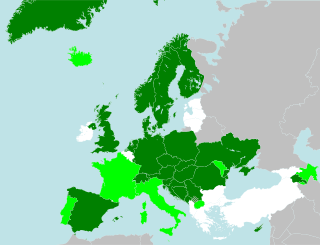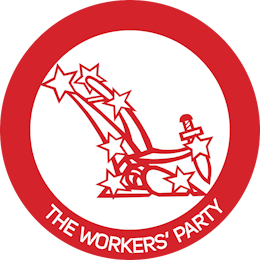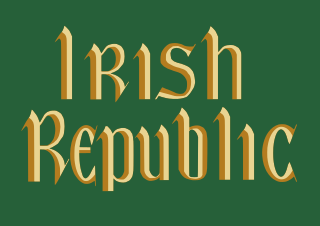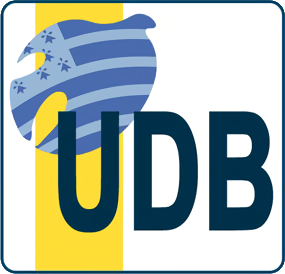
The European Charter for Regional or Minority Languages (ECRML) is a European treaty adopted in 1992 under the auspices of the Council of Europe to protect and promote historical regional and minority languages in Europe. However, the charter does not provide any criterion or definition for an idiom to be a minority or a regional language, and the classification stays in the hands of the national state.

Syndicalism is a revolutionary current within the labour movement that, through industrial unionism, seeks to unionize workers according to industry and advance their demands through strikes, with the eventual goal of gaining control over the means of production and the economy at large through social ownership. Developed in French labor unions during the late 19th century, syndicalist movements were most predominant amongst the socialist movement during the interwar period that preceded the outbreak of World War II.

The Workers' Party is an Irish republican, Marxist–Leninist communist party active in both the Republic of Ireland and Northern Ireland.
A minority language is a language spoken by a minority of the population of a territory. Such people are termed linguistic minorities or language minorities. With a total number of 196 sovereign states recognized internationally and an estimated number of roughly 5,000 to 7,000 languages spoken worldwide, the vast majority of languages are minority languages in every country in which they are spoken. Some minority languages are simultaneously also official languages, such as Irish in Ireland or the numerous indigenous languages of Bolivia. Likewise, some national languages are often considered minority languages, insofar as they are the national language of a stateless nation.

Irish republicanism is the political movement for the unity and independence of Ireland under a republic. Irish republicans view British rule in any part of Ireland as inherently illegitimate.

The Irish Republican Socialist Party or IRSP is a minor communist, Marxist–Leninist and Irish republican party in Ireland. It is often referred to as the "political wing" of the Irish National Liberation Army (INLA) paramilitary group. It was founded by former members of Official Sinn Féin in 1974 during the Troubles, but claims the legacy of the Irish Socialist Republican Party of 1896–1904.

The Freedom Road Socialist Organization (FRSO) is a Marxist–Leninist organization in the United States. FRSO formed in 1985 amid the collapse of the Maoist-oriented New Communist movement that emerged in the 1970s. The FRSO's component groups believed that ultraleftism was the US New Communist movement's main error. Merging under the FRSO banner, these groups hoped to consolidate the movement's remnants in a single organization and move beyond the sectarianism that marked the previous decades.
Anarchism and nationalism both emerged in Europe following the French Revolution of 1789 and have a long and durable relationship going back at least to Mikhail Bakunin and his involvement with the pan-Slavic movement prior to his conversion to anarchism. There has been a long history of anarchist involvement with nationalism all over the world as well as with internationalism.

Left-wing terrorism or far-left terrorism is terrorism motivated by left-wing or far-left ideologies, committed with the aim of overthrowing current capitalist systems and replacing them with communist or socialist societies. Left-wing terrorism can also occur within already socialist states as criminal action against the current ruling government.
The Galician People's Union is a Galician nationalist and communist political party, and is one of the registered political parties of Spain. The party publishes the magazine Terra e Tempo, and the secretary general is Néstor Rego.

Breton Democratic Union is a Breton nationalist, autonomist, and regionalist political party in Brittany and Loire-Atlantique. The UDB advocates devolution for Brittany as well as the promotion of its regional languages and its associated culture.
Internationalist and defencist were the broad opposing camps in the international socialist movement during and shortly after the First World War. Prior to 1914, anti-militarism had been an article of faith among most European socialist parties. Leaders of the Second International had even suggested that socialist workers might foil a declaration of war by means of a general strike.

The Revolutions of 1917–1923 were a revolutionary wave that included political unrest and armed revolts around the world inspired by the success of the Russian Revolution and the disorder created by the aftermath of World War I. The uprisings were mainly socialist or anti-colonial in nature. Some socialist revolts failed to create lasting socialist states. The revolutions had lasting effects in shaping the future European political landscape, with for example the collapse of the German Empire and the dissolution of Austria-Hungary.

The French Left refers to communist, socialist, and social-democratic political forces in France. The term originates from the National Assembly of 1789, where supporters of the revolution were seated on the left of the assembly. During the 1800s, left largely meant support for the Republic, whereas right largely meant support for the monarchy.
Workers' Power is a Trotskyist group which forms the British section of the League for the Fifth International. The group publishes the newspaper Workers Power and distributes the English-language journal Fifth International.

The Socialist Party of Great Britain (SPGB) is a socialist political party in the United Kingdom. Founded in 1904 as a split from the Social Democratic Federation (SDF), it advocates using the ballot box for revolutionary purposes and opposes both Leninism and reformism. It holds that countries which claimed to have established socialism had only established "state capitalism" and was one of the first to describe the Soviet Union as state capitalist. The party's political position has been described as a form of impossibilism.

International Socialist Alternative is an international association of Trotskyist political parties.












